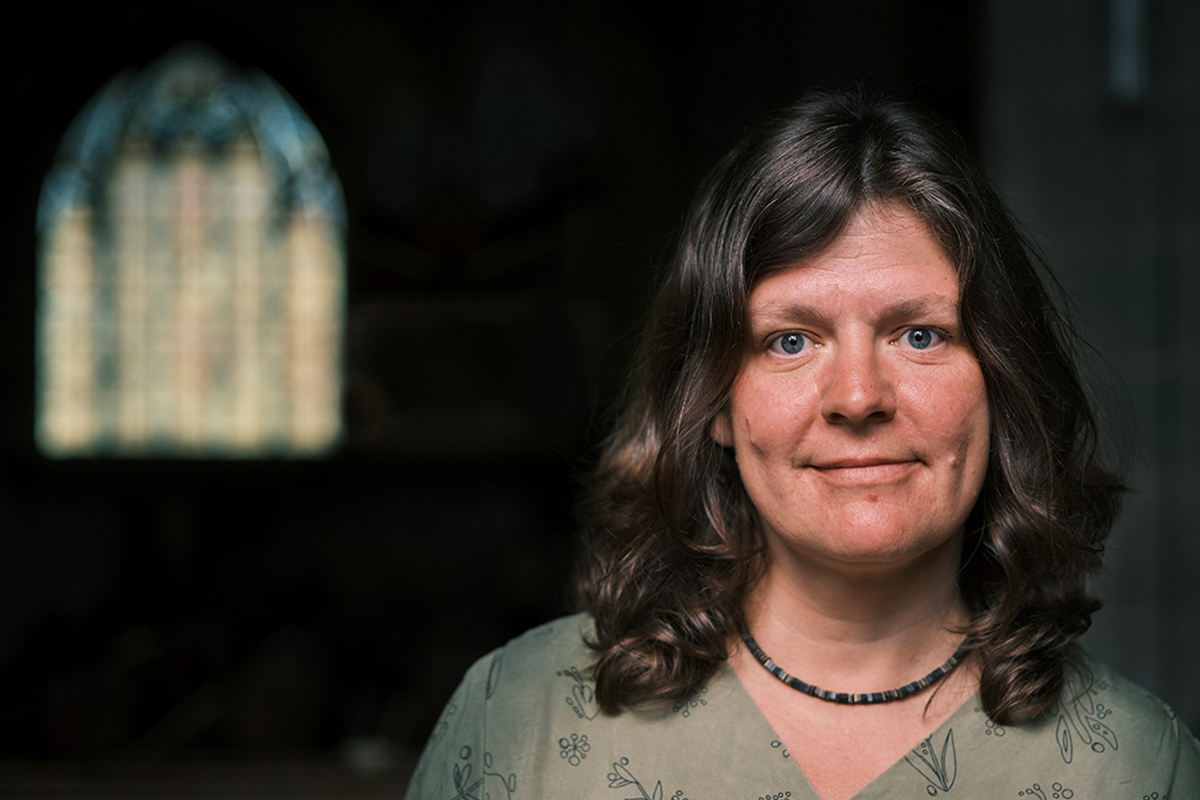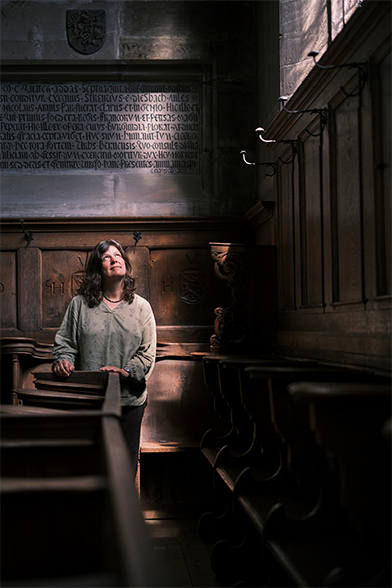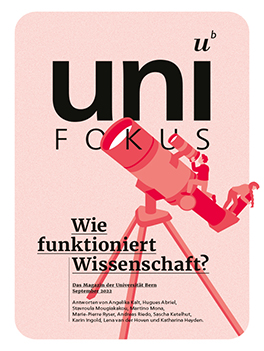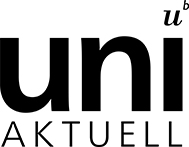Theology
“A lecture is not a sermon”
Katharina Heyden is Professor of Ancient History of Christianity and is an ordained priest. Her research focuses in particular on interreligious encounters. She obtains her research material from text sources, art and archeology.

Ms Heyden, how did you come to get your professorship?
Katharina Heyden: This professorship is classically called “Early Church and Dogma History”. The term “History of Christianity” shows how the subject has changed over the last few decades: It is no longer only about the history of the churches that have passed the test of time but all those persons and institutions who feel they belong to Christianity. “Interreligious encounters” is a focus the Bern Faculty of Theology added when they advertised the professorship – the intention being to investigate in more detail the interrelation of Christianity with other religious, particularly with Judaism and Islam. There is no other university with this kind of professorship at the current time. That was perfect for me because I had already dealt with interreligious topics in my dissertation and my habilitation.
How did you come to the University of Bern?At first it was by chance: I applied in 2013 because a professorship had been advertised and there are very few posts in my subject. This chance turned out to be a stroke of luck: The University of Bern offers young scientists and academics in particular an exciting, open environment with lots of opportunities to engage in interdisciplinary research. One disadvantage in comparison to lots of other universities is, however, that we have fewer research semesters.
How would you explain your work to a child?I visit libraries, manuscript departments and museums or travel around the world, always looking for traces of Christianity, from its beginnings up until the 15th century. While doing so I think about what could be interesting with regard to the questions that concern us today. I analyze these sources, continue the research and then write a few articles and books on my findings. Ultimately, I focus on the question: What can we learn from history?
I don’t just use texts for this, but also sources from fine arts and archeology; in other words, all the traces that Christianity has left behind in the lives and thoughts of people. I ask myself: How did Christianity develop in constant dispute with its environment? What still applies today and what is passé?
How do you find ideas for new research projects?On the one hand, I encounter the material I work on at every turn. I visit a church during the vacation or stumble over an interesting script by chance. I might just suddenly have an idea or it might develop as I am talking to colleagues. Naturally there are also important topics which are brought to the attention of science and academia. The University of Bern has defined several focuses in its strategy, one of which is “intercultural knowledge”. The question is what I can contribute to that in my subject.
What role does interdisciplinarity play in your field?A very important one. Theology has always been interdisciplinary; it has references to textual and literary studies, to cultural sciences and to philosophy. In my subject, interdisciplinarity is of great importance. But there are still theologians who think they can process all relevant aspects of the religions themselves. I feel, however, that you need specialists from the other subjects. Interdisciplinarity is necessary and informative – and is fun! But it is not a matter of course and not always easy.
What difficulties do you meet in your research?The immediate benefits of the humanities are not as easily explained as those of medicine, for example. In 2018 the University of Bern set up three major interfaculty research cooperations. That was very competitive, but worked very well in my area: We received funding for the research cooperation “Religious Conflicts and Coping Strategies”. But when it came to establishing a national research focus, no proposal from the humanities got through. Our subjects rarely offer simple answers, let alone practical solutions to the complex human problems of our time. Often it is a case of pointing out the complexity. Our society is used to thinking in models, figures and formulas. Working in humanities, I sometimes try to adapt to this way of thinking. But it doesn’t always work. As far as theology is concerned, even among the humanities it has the reputation of being more an ideological subject that a scientific one. This accusation is luckily not so strong in my area because we work with the same methods used by historians.

What characterizes your research in comparison to other areas?
My approach is to examine the past using the questions of the present. Not all theologians and historians see that as being right. Some are more concerned with understanding a specific century or the ideas of a theologian particularly well. But I also always ask myself what role does religion play today, where it can be found in conflicts and what all that has to do with its history. My latest research project, that I am carrying out in cooperation with the Institute for Advanced Study Princeton, deals with the thesis that Christianity, Judaism and Islam cannot be understood without the other religious because they have been strongly intertwined throughout history. That is important for today’s society to understand. For example, there is the question of whether Islam belongs to Europe. And It is easier to fight the new form of Antisemitism if you know the history of anti-Judaism in Christianity and Islam. So I can tackle modern problems better with historical knowledge – even if history never holds simple answers to today's questions.
Why would young people today still want to study theology?Theology is ideal for people who are interested in the mysteries of being human, who like to philosophize, also about things that cannot be seen, and who focus on the meaning of life. Perhaps theology is the last universal subject: You learn languages, history, philosophy, logical thinking, empirical research methods and practical skills. The history of Christianity is not a subject in splendid isolation, but has lots of links to other disciplines. And theology is a subject in which you meet interesting students, often quite dynamic and at the same time sensitive people.
Is there anything about your work that annoys you?The fact that theology today still has an image of not being a real science is annoying. And that hasn’t been true for a long time. Because it spent a long time being fiercely questioned, theology is now more self-reflective and methodical than almost any other science. In lectures and discussions, it is often the case that you have to get rid of the old image before you do anything else. The theological contributions which do things as they used to be done and don’t make the distinction between university and church particularly annoy me. These are two different spaces in which people should think and speak in different ways. A lecture is not a sermon.
Which unresolved questions would you like to answer?On the one hand, the question about under which historical and social conditions religions, particularly Christianity, develop their peace-promoting or war-driving powers. Every religion has the potential for both; but what is unresolved is why at times one force comes to bear, and, at others, a different one. On the other hand, as I already mentioned, I am working on the joint religious history of Christianity, Judaism and Islam, in collaboration with Princeton.
What do you do when you are not working?I think about my subject wherever I go. Otherwise I make and also listen to music, and love literature. Thanks to the interests of my children, I am very involved in painting, fashion design and sport. Since the corona pandemic, I have loved experimenting in my garden, although what I do is not always successful. I find it difficult to separate my hobbies and my work, but it’s not like I sit at my desk all day. I am out and about a lot. History determines the present and you can look at history all the time, wherever you go.
About
Katharina Heyden
Prof. Dr. Katharina Heyden is Professor of Ancient History of Christianity and Interreligious Encounters at the Faculty of Theology at the University of Bern.
Contact: katharina.heyden@unibe.ch
New magazine uniFOKUS

Subscribe free of charge now!
This article first appeared in uniFOKUS, the new University of Bern print magazine. Four times a year, uniFOKUS shows what academia and science are capable of. Thematically, each issue focuses on one specialist area from different points of view and thus aims to bring together as much expertise and as many research results from scientists and other academics at the University of Bern as possible.
The online magazine of the University of Bern

Subscribe to the uniAKTUELL newsletter
The University of Bern conducts cutting-edge research on topics that concern us as a society and shape our future. In uniAKTUELL we show selected examples and introduce you to the people behind them – gripping, multimedia and free of charge.